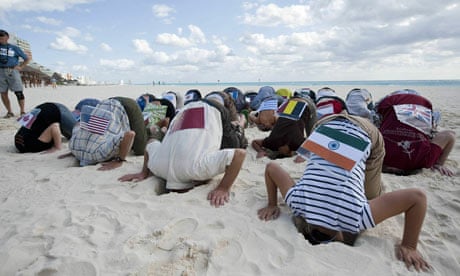The UN climate talks in Cancún were in danger of collapse last night after many Latin American countries said that they would leave if a crucial negotiating document, due to be released tomorrow, did not continue to commit rich countries to emissions cuts under the Kyoto protocol.
The Bolivarian Alliance for the Americas (Alba) group of nine Latin American countries – who claim they are backed by African, Arab countries and other developing nations – said they were not prepared to see an end to the treaty that legally requires all of its signatories to reduce greenhouse gas emissions.
They challenged the Mexican presidency of the UN summit to prepare a negotiating text including a commitment by rich countries to set fresh targets for a second period of Kyoto beyond 2012.
The Guardian understands that if the new text includes a reference to a continuation of the Kyoto protocol, the talks will continue. But if it omits the wording and opts only to support negotiations based on the weaker Copenhagen accord agreed last year, then developing countries are likely to stop the talks.
Mexico will publish its text on Saturday evening in preparation for the arrival of ministers from 193 countries for the high-level talks on Monday. The energy and climate change secretary Chris Huhne will arrive then, leading the UK delegation.
The potential crisis was provoked by Japan stating earlier this week that it would not sign up to a second period of the Kyoto Protocol.
Other countries, including Russia, Canada and Australia are thought to agree but have yet to say publicly that they will not make further pledges.
Kyoto is considered iconic to developing countries because it is the only legal agreement that binds rich countries to emissions cuts. It is feared that wealthy countries, led by the US, which has not ratified the treaty, want an agreement that will commit them only loosely to targets.
"We will not support any situation where these countries get away with this and make no commitments. We want concrete commitments for Kyoto. A handful of countries have no right to do this," said Claudia Salerno, Venezuela's special climate envoy.
Salerno was joined in Cancún by diplomats from Bolivia, Nicaragua, Dominica and Ecuador, who said they speak for other Alba members including Antigua, Honduras and St Vincent.
She said she had come from a meeting where one country, presumably Australia, had said "they might as well go to the beach" rather than set new pledges for Kyoto. "We will not accept the destruction of the Kyoto protocol in exchange for anything. The new text must include the second period of Kyoto," she said.
Wealthy countries were last night trying to avoid a diplomatic disaster, saying they were not trying to kill Kyoto. Britain and the EU have said they are prepared to sign up to a second commitment period – provided others do so too.
Developed countries have indicated in closed meetings that there is now little chance of a second commitment period for Kyoto being negotiated in Cancún.
Few heads of state are expected to attend this year's talks – in sharp contrast to the summit in Copenhagen. However, Hugo Chávez, president of Venezuela, Rafael Correa, president of Ecuador, and Bolivia's Evo Morales have said they will be there. All were accused by Gordon Brown of "holding the world to ransom" at the Copenhagen talks. They will be joined by the presidents of Nicaragua, Costa Rica, Colombia, Brazil and Guatemala.

Comments (…)
Sign in or create your Guardian account to join the discussion